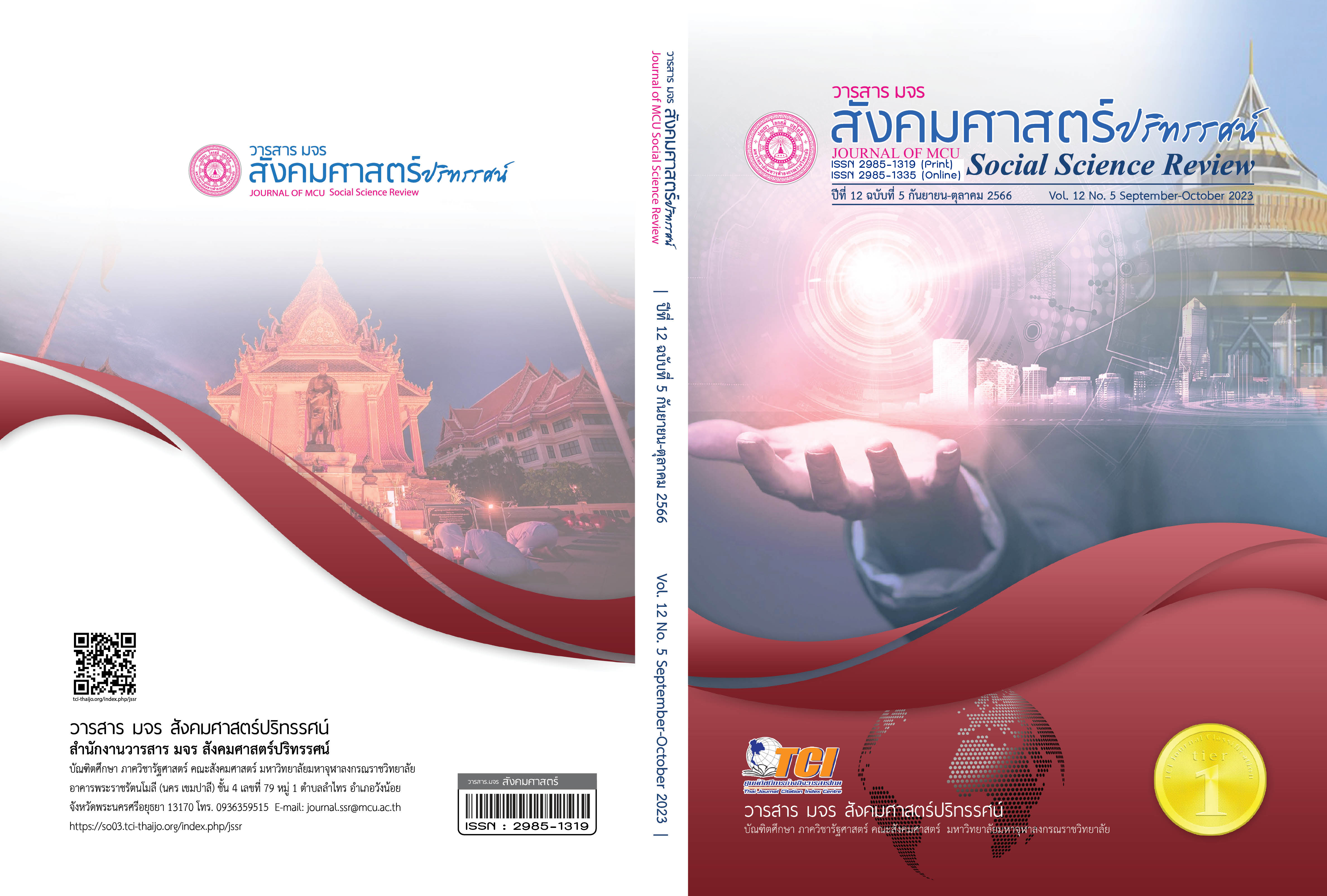ความเปลี่ยนแปลงทางสังคมกับการพัฒนาประชาธิปไตยดิจิทัล ของประเทศสาธารณรัฐเกาหลีเปรียบเทียบประเทศไทย
คำสำคัญ:
ประชาธิปไตยดิจิทัล, สังคมสมัยใหม่, สาธารณรัฐเกาหลี, ประเทศไทยบทคัดย่อ
บทความวิจัยนี้มุ่งศึกษาพัฒนาการ ทิศทาง และแนวโน้มความเปลี่ยนแปลงทางสังคมกับการพัฒนาประชาธิปไตยดิจิทัลของสาธารณรัฐเกาหลีเปรียบเทียบประเทศไทย เพื่อเสนอแนะแนวทางในการพัฒนาประชาธิปไตยดิจิทัลที่ตอบสนองต่อความท้าทายในสังคมสมัยใหม่ของประเทศสาธารณรัฐเกาหลีและประเทศไทย การวิจัยนี้เป็นการวิจัยแบบผสานวิธี ผลการวิจัยพบว่า การปรากฏของเทคโนโลยีดิจิทัล การเกิดความเป็นเมือง และความเปลี่ยนแปลงทางประชากรได้สร้างแพลตฟอร์มใหม่สำหรับการมีส่วนร่วมทางการเมือง นำไปสู่การพัฒนาประชาธิปไตยดิจิทัล อย่างไรก็ตาม ยังคงมีปัญหาอุปสรรคด้านโครงสร้างรัฐและการเมือง ด้านเศรษฐกิจและความเหลื่อมล้ำ และด้านสังคมและวัฒนธรรมที่เป็นข้อจำกัดของการพัฒนาประชาธิปไตยดิจิทัลของทั้งสองประเทศ
เอกสารอ้างอิง
Al-Saggaf, Y., & Simmons, P. (2015). Social Media in Saudi Arabia: Exploring its Use during Two Natural Disasters. Technological Forecasting and Social Change, 95, 3-15. Doi: 10.1016/j.techfore.2014.08.013
Asadi, A. (2017). A Role of Digital Media on Discussing about the Diplomacy in the World. Open Journal of Political Science, 7, 267-275. Doi: 10.4236/ojps.2017.72021
BBC. (2019). Thailand profile-timeline. BBC News. Retrieved March 20, 2022, https://www.bbc.com/news/world-asia-15641745
Bennett, W. L., & Segerberg, A. (2012). The logic of connective action: Digital media and the personalization of contentious politics. Information, Communication & Society, 15(5), 739–768. Doi: 10.1080/1369118X.2012.670661
Boulianne, S. (2015). Social media use and participation: A meta-analysis of current research. Information, Communication & Society, 18(5), 524-538. DOI: 10.1080/1369118X.2015.1008542
Castells, M. (2009). The Rise of the Network Society. Wiley-Blackwell Publishers.
Chua, L. (2018). Small acts and personal politics: On helping to save the orangutan via social media. Anthropology Today, 34: 7-11. Doi: 10.1111/1467-8322.12432
Freedom House. (2020). Freedom on the Net 2020. Thailand: Freedom House.
Hewison, K. (2014). Thailand: The Lessons of Protest. Asian Studies: Journal of Critical Perspectives on Asia, 50(1), 1-15.
Howard, P. N., & Parks, M. R. (2012). Social Media and Political Change: Capacity, Constraint, and Consequence. Journal of Communication, 62(2), 359-362. Doi: 10.1111/j.1460-2466.2012.01626.x
Kim, C., & Kim, K. (2021). The Institutional Change from E-Government toward Smarter City; Comparative Analysis between Royal Borough of Greenwich, UK, and Seongdong-gu, South Korea. Journal of Open Innovation: Technology, Market, and Complexity, 7(1), 1-33.
Lee, J., Oh, C., & Kim, Y. (2023). The Candlelight Movement, Democracy, and Communication in Korea. Routledge.
Macintosh, A. (2004). Characterizing e-participation in policymaking. International Journal of Information Management, 27(2007), 406 –421.
Macnamara, J., & Zerfass, A. (2012). Social Media Communication in Organizations: The Challenges of Balancing Openness, Strategy, and Management. International Journal of Strategic Communication, 6(4), 287-308. DOI: 10.1080/1553118X.2012.711402
Nyblade, B., O’Mahony, A. & Sinpeng, A. (2015). Social Media Data and the Dynamics of Thai Protests. Asian Journal of Social Science, 43(5), 545–566.
OECD. (2020). Open Government Data in South Korea. Open Government Data Review.
Tanakasempipat, P. (2019). Thailand passes internet security law decried as 'cyber martial law. Reuters. Retrieved March 20, 2022, www.reuters.com/us-thailand
Turner, M., Kim, J., Kwon, S.-H. (2022). The Political Economy of E-Government Innovation and Success in Korea. Journal of Open Innovation: Technology, Market, and Complexity, 8(145) Doi 10.3390/joitmc8030145
ดาวน์โหลด
เผยแพร่แล้ว
รูปแบบการอ้างอิง
ฉบับ
ประเภทบทความ
สัญญาอนุญาต
ลิขสิทธิ์ (c) 2023 วารสาร มจร สังคมศาสตร์ปริทรรศน์

อนุญาตภายใต้เงื่อนไข Creative Commons Attribution-NonCommercial-NoDerivatives 4.0 International License.
เพื่อให้เป็นไปตามกฎหมายลิขสิทธิ์ ผู้นิพนธ์ทุกท่านต้องลงลายมือชื่อในแบบฟอร์มใบมอบลิขสิทธิ์บทความให้แก่วารสารฯ พร้อมกับบทความต้นฉบับที่ได้แก้ไขครั้งสุดท้าย นอกจากนี้ ผู้นิพนธ์ทุกท่านต้องยืนยันว่าบทความต้นฉบับที่ส่งมาตีพิมพ์นั้น ได้ส่งมาตีพิมพ์เฉพาะในวารสาร มจร สังคมศาสตร์ปริทรรศน์ เพียงแห่งเดียวเท่านั้น หากมีการใช้ภาพหรือตารางหรือเนื้อหาอื่นๆ ของผู้นิพนธ์อื่นที่ปรากฏในสิ่งตีพิมพ์อื่นมาแล้ว ผู้นิพนธ์ต้องขออนุญาตเจ้าของลิขสิทธิ์ก่อน พร้อมทั้งแสดงหนังสือที่ได้รับการยินยอมต่อบรรณาธิการ ก่อนที่บทความจะได้รับการตีพิมพ์ หากไม่เป็นไปตามข้อกำหนดเบื้องต้น ทางวารสารจะถอดบทความของท่านออกโดยไม่มีข้อยกเว้นใดๆ ทั้งสิ้น





